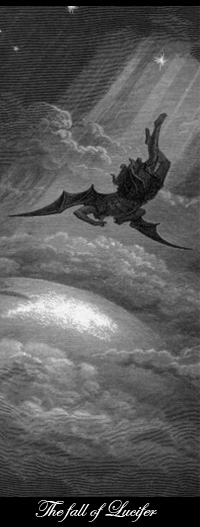 |
Pekelný kníze Vás zve na prohlídku svého hradu...
Lucifer je jedno ze jmen jméno obvykle pouzívaných pro Satana, ale jeho význam je sirsí: svetlonos, jitrenka. Jméno Lucifer pochází z latiny (lux = svetlo, fero = nesu), kde znamená v prekladu svetlonos, tj. v prvé rade jitrenka (tj. jitrní hvezda, Venuse) a v bezné latine nemá zádný zvlástní význam. Lucifer nazývali Venusi pravdepodobne i rímstí astrologové, nez dostala jméno Venuse. To zacala získávat az v krestanství. Svatý Jeroným tímto termínem prekládá vers v knize Izijás 14,12: Jak jsi spadl z nebe, trpytivá hvezdo, jitrenky synu! Jak jsi srazen k zemi, zotrocovateli pronárodu! V puvodním významu tento vers nemá se Satanem nic spolecného. Avsak z hlediska krestanské mytologie, která se rozvinula po Jeronýmovi, se Lucifer stal nejvyssím andelem, hodností a mocí hned po Bohu. Pro svou pýchu vsak se postavil proti nemu a Buh jej srazil z nebe i s jeho andely, kterí jej následovali. Tak se stal zlým knízetem Pekel a jeho následovníci jsou známí jako démoni. Pod vickem najdes dalsi indicie pro cache INFERNO.
The ruler of the Hell invites you to his castle...
Lucifer is a Latin word meaning "light-bearer" (from lux, "light", and ferre, "to bear"), a Roman astrological term for the "Morning Star", the planet Venus. The word Lucifer was the direct translation of the Greek eosphoros ("dawn-bearer"; cf. Greek phosphoros, "light-bearer") used by Jerome in the Vulgate, having mythologically the same meaning as Prometheus who brought fire to humanity. In that passage, Isaiah 14:12, it referred to one of the popular honorific titles of a Babylonian king; however, later interpretations of the text, and the influence of embellishments in works such as Dante's The Divine Comedy and Milton's Paradise Lost, led to the common idea in Christian mythology and folklore that Lucifer was a poetic appellation of Satan.
In modern and late Medieval Christian thought, Lucifer is usually a fallen angel commonly associated with Satan, the embodiment of evil and enemy of God. Lucifer is generally considered, based on the influence of Christian literature and legend, to have been a prominent archangel in heaven (although some contexts say he was a cherub or a seraph), prior to having been motivated by pride to lead a revolution against God. When the angel failed, Lucifer was cast out of heaven, along with a third of the heavenly host, and came to reside in the world. Find more clues for the bonus cache INFERNO under the cover of the box.
|